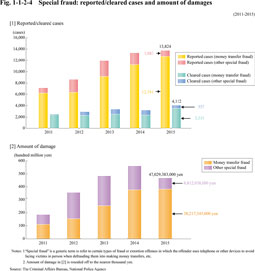3 Special fraud
Fig. 1-1-2-4 shows the trends of reported/cleared cases of so-called “special fraud (including extortion),” and the amounts of damage caused. Special fraud is a generic term referring to a type of fraud or extortion offenses in which the offender uses a telephone or other device to avoid facing victims in person when defrauding/intimidating them into making money transfers or other means to profit the offender. Among various schemes used in special fraud, those counted as “money-transfer fraud” include so-called “It's me” fraud (The offender pretends to be the son or someone close to the victim in need of urgent monetary assistance.), fictitious billing fraud, loan deposit fraud (The offender defraud victim that an advance deposit is required to obtain the loan.) or fictitious refund fraud (The offender pretends to be a public official to assist the victim to receive tax refund or other type of repayment.). Schemes of “other special fraud” may include, inter alia, sales of fraudulent financial products, provision of (baseless) information such as how to win in gambling or fraudulent date-matching.
Fig. 1-1-2-4 Special fraud: reported/cleared cases and amount of damages
